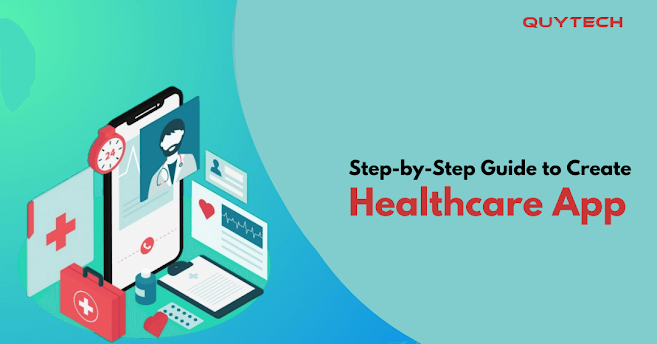Step by Step Guide to Create Healthcare App
The healthcare industry is rapidly embracing digital transformation, and healthcare apps have become essential tools for improving patient care, enhancing communication between healthcare providers and patients, and streamlining administrative processes. If you're considering creating a healthcare app, this step-by-step guide will help you navigate the development process and create a successful app that addresses the specific needs of the healthcare industry.
Step 1: Define Your App's Purpose and Target Audience
Begin by clearly defining the purpose of your healthcare app. Determine the specific problem it aims to solve or the value it brings to healthcare professionals, patients, or both. Identify your target audience, such as doctors, nurses, patients, or healthcare administrators, and understand their unique needs, pain points, and preferences. This information will guide your app's design and development decisions.
Step 2: Research and Compliance
Thoroughly research the regulatory and compliance requirements for healthcare apps in your target market. Familiarize yourself with data privacy regulations, such as the Health Insurance Portability and Accountability Act (HIPAA) in the United States, and ensure that your app complies with these standards. Understand the legal and security considerations related to handling sensitive patient data and incorporate them into your app's development plan.
Step 3: Collaborate with Healthcare Professionals
Engage with healthcare professionals, such as doctors, nurses, and administrators, to gain valuable insights into their workflows, pain points, and requirements. Collaborate with them throughout the development process to ensure that your app meets their needs and enhances their efficiency and productivity. Their input will be crucial for creating a user-friendly and effective healthcare app.
Step 4: Determine Key Features
Identify the key features and functionalities your healthcare app should offer. Common features include:
Electronic Health Records (EHR): Enable healthcare providers to access and update patient records securely, ensuring seamless continuity of care.
Appointment Scheduling: Allow patients to schedule appointments, receive reminders, and manage their healthcare appointments efficiently.
Telemedicine: Integrate video or chat functionality to enable remote consultations between healthcare providers and patients.
Medication Reminders: Provide reminders for patients to take their medications and track adherence to treatment plans.
Health Tracking: Enable patients to monitor and track their health metrics, such as blood pressure, heart rate, or glucose levels.
Secure Messaging and Communication: Facilitate secure communication between healthcare providers and patients, ensuring efficient and confidential information exchange.
Health Education: Offer educational resources, articles, or videos to empower patients with relevant health information.
You can consult the best mobile app development company to get more information on dating apps and their other features.
Step 5: User Interface and Design
Design a user-friendly interface that provides a seamless and intuitive experience for both healthcare professionals and patients. Keep the design clean, simple, and visually appealing. Prioritize ease of use and accessibility, ensuring that users can navigate the app effortlessly. Conduct user testing and gather feedback to refine the design and make necessary improvements.
Step 6: Data Security and Privacy
Implement robust security measures to protect patient data and ensure compliance with privacy regulations. Encrypt sensitive data, implement secure user authentication methods, and store data on reliable and secure servers. Conduct regular security audits and stay up to date with the latest security practices to maintain the confidentiality and integrity of patient information. Connect with the artificial intelligence development company to make your healthcare app secure and viable.
Step 7: Integration with Healthcare Systems
Consider integrating your healthcare app with existing healthcare systems, such as Electronic Health Record (EHR) systems or hospital information systems, to ensure seamless data exchange and interoperability. Collaborate with healthcare IT professionals to ensure compatibility and compliance with existing infrastructure.
Step 8: Testing and Quality Assurance
Thoroughly test your healthcare app to ensure its functionality, reliability, and usability. Conduct comprehensive testing to identify and fix any bugs, compatibility issues, or performance bottlenecks. Test the app in real-world scenarios to simulate user experiences and gather feedback for further improvements.
Step 9: Compliance and Regulatory Review
Before launching your healthcare app, conduct a thorough compliance and regulatory review to ensure that it meets all legal requirements and guidelines. Collaborate with legal and compliance experts to ensure your app aligns with relevant healthcare regulations.
Step 10: Launch and Continuous Improvement
Execute a strategic launch plan for your healthcare app. Leverage app store optimization techniques to enhance its visibility and promote it through various channels, such as healthcare conferences, online communities, and targeted marketing campaigns. Gather user feedback, monitor app performance, and continuously iterate and improve your app based on user needs and changing industry trends.




Comments
Post a Comment